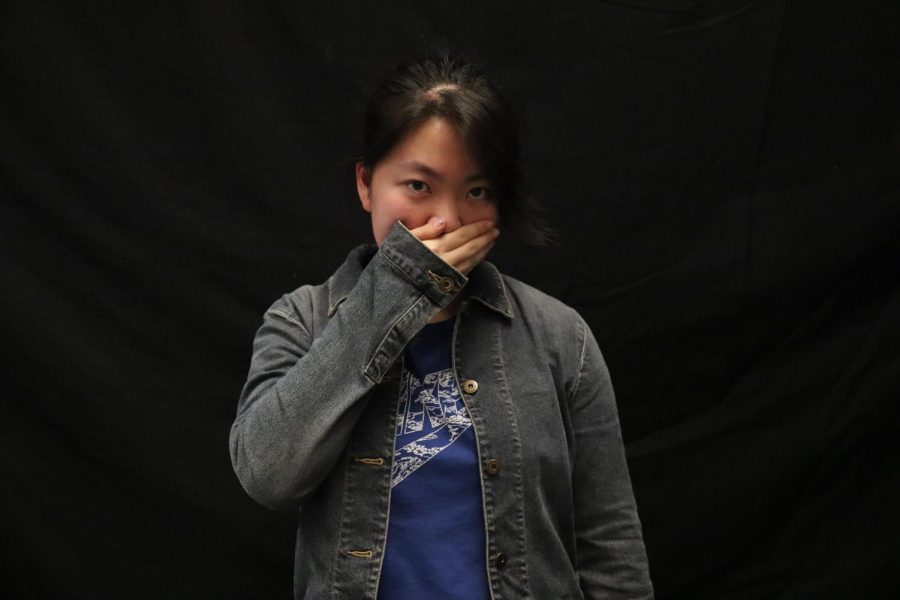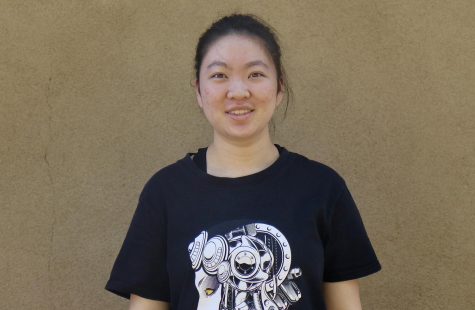My Own Farewell
Writer Renee Ge stands with her hand over mouth, symbolizing the silences discussed in both Lulu Wang’s movie “The Farewell” and Ge’s column.
October 2, 2019
When my grandfather was in and out of the hospital for a tumor in his abdomen, my dad dropped everything to spend time with him. I would often come home from school to find out that he had bought another last-minute ticket to China. Then, we discovered that the tumor was cancerous. As soon as school ended, I was on a plane, hearing my mom order me not to tell my grandfather about his diagnosis. He couldn’t know.
It had just rained, making the air in the hospital so humid I thought I would choke on it. The bright lights stung my eyes. The floor was sticky. People crowded into the elevator behind my mother and me and packed us in the back. This was the China I knew: jostling crowds, rapid-fire conversations and a hint of cigarette smoke in the air. Dazed and heavily jetlagged, I clung to the familiarity the best I could.
Speaking with my grandfather was painful. His cheeks were hollow and pallid, and the surgeries he had undergone had made him so thin that the blanket covering him laid almost flat across the bed. I hadn’t seen him in two years, and he seemed like a stranger.
He believed his tumor was benign. I listened to him promise to live into his late nineties, as his own mother had. He said he could push through this. He wished me good luck in my studies, and told me not to worry about him. Deep down, I felt like what I was doing to my grandfather was fundamentally wrong — although I never said the words, “your tumor is benign,” saying nothing felt the same as lying. What if he has things on his bucket list he will never get to do? He could want to travel somewhere he has never been before, have a last dinner with his family and say goodbye, but I was taking those decisions out of his hands. But the presence of the family — my mother, grandmother, aunt and uncle — placed a heavy weight on my shoulders and left the truth stuck in my throat. I was the young American outsider who spoke in accented Chinese, and could not interfere in things I did not understand. So I kept silent.
I could never fully articulate why I felt so conflicted until I watched the movie “The Farewell” with my mother later in the summer, after I had come back from China. “The Farewell” follows a Chinese-American woman, Billi, who discovers that her grandmother has stage four lung cancer and is told by her family to lie to her grandmother about it. I found myself connecting deeply with Billi; her love for her grandmother, her regret of not spending enough time with her and her hesitance to go against her family were all emotions I felt in my grandfather’s hospital room. I cried when Billi cried and laughed when Billi laughed, but most importantly, the movie made me understand my family’s perspective.
In the movie, Billi’s uncle explains to her that in Billi’s Americanized philosophy, a person’s life belongs to themselves. “But that’s the difference between the East and the West. In the East, a person’s life is part of a whole. Family.” Like Billi’s family, my family didn’t want my grandfather to suffer with the knowledge of his diagnosis, so they decided to carry that burden themselves.
Eventually, I agreed with my family. My grandfather has lived a long, happy life. He may not know his diagnosis, but this way, he will not look at his future with fear and nervously count how many days he has left before he goes to sleep. Instead, he will continue as he always has, and get up each morning to go for a walk. He will see the country he has lived in his whole life, the China he knows. I know when I visit him again, he will greet me with a smile.



































































